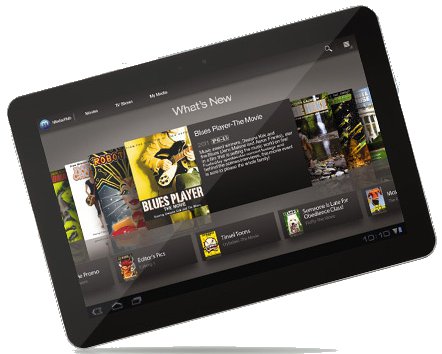Microsoft taps Samsung for Android royalties
Sep 28, 2011 — by Eric Brown — from the LinuxDevices Archive — 1 viewsMicrosoft has reeled in what could be its largest patent fish yet, now that Samsung has agreed to sign a cross-license agreement related to Android in a deal stressing the companies' partnership on Windows Phone. Microsoft will receive royalties for Samsung's Android-based mobile phones and tablets, such as the new Galaxy Tab 8.9 tablet scheduled for release on Oct. 2.
Microsoft's deal with Samsung is the latest in a series of patent "partnership" announcements regarding Linux or Android. According to a Sept. 28 press release, it covers "Samsung's mobile phones and tablets running the Android mobile platform" — presumably, all of them — and as usual the royalty percentage is not revealed.
The pact between the two was first rumored back in early July when Reuters said Microsoft and Samsung were in negotiations. According to Reuters at the time, Samsung would "likely seek to lower the payment" from a whopping $15 per phone to about $10 in exchange for "a deeper alliance with Microsoft" and its Windows Phone platform.
A Mango connection
Indeed, unlike most such announcements, this one stresses the companies' partnership on Windows Phone. "Microsoft and Samsung see the opportunity for dramatic growth in Windows Phone and we're investing to make that a reality," stated Andy Lees, president, Windows Phone Division, Microsoft.
Stated Won-Pyo Hong, executive vice president of global product strategy at Samsung's mobile communication division, "Through the cross-licensing of our respective patent portfolios, Samsung and Microsoft can continue to bring the latest innovations to the mobile industry. We are pleased to build upon our long history of working together to open a new chapter of collaboration beginning with our Windows Phone 'Mango' launch this fall."
On Sept. 26, Samsung announced an Omnia W smartphone running Windows Phone 7.5 ("Mango"), which began rolling out this week. The vast majority of Samsung's mobile devices, however, are based on Android. These include its phenomenally successful Samsung Galaxy S II phones, which are finally arriving in the U.S., and its well-regarded Samsung Galaxy Tab 10.1 tablets.

Samsung Galaxy Tab 8.9
Following HTC and others on the path to submission
Not since HTC agreed to patent terms with Microsoft over Android in April 2010 has Redmond landed such a potentially lucrative patent partner. Last week, Microsoft and Casio agreed to terms over Linux-related patents, but most of Microsoft's patent agreements this year have related to the Linux-based Android.
These includes deals signed earlier this month with Acer and ViewSonic. In June of this year, Microsoft corralled three other Android device manufacturers: General Dynamics Itronix, Onkyo, and Velocity Micro.
Both Motorola and Barnes & Noble, however, chose to fight out their respective battles in court rather than submit to a pay-off. As noted by ZDNet's Stephen J. Vaughan Nichols, even if they win, the cost of fighting Microsoft's formidable legal team over several years could cost them more than the patent agreement.
"For what might be a nominal fee, Samsung and other companies avoid wasting years of time and money in court fighting them," he writes. (If the payment is anywhere close to $15 per device, Samsung must have given the alternative some consideration, however.)
Samsung has been battling it out with Apple in the courts over Android related patents, and may have decided that fighting two legal wars at once was a risky strategy. Considering that Windows Phone is expected by many to emerge as the number three smartphone platform behind Android and Apple iOS, a Microsoft deal may have seemed inevitable.
Windows Phone gives Samsung some leverage against Google in case its acquisition of Motorola Mobility puts the screws to other Android OEMs. To further hedge its bets, today Samsung announced it is joining Intel to cosponsor a MeeGo and LiMo based mobile platform called Tizen, and it is also actively pushing its Bada operating system.
This article was originally published on LinuxDevices.com and has been donated to the open source community by QuinStreet Inc. Please visit LinuxToday.com for up-to-date news and articles about Linux and open source.